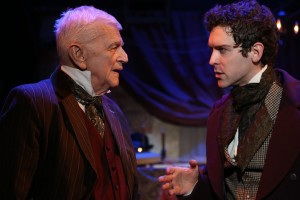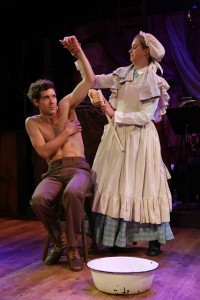We all want to know what happened to Tiny Tim, don’t we? Did he grow up healthy and strong? What was his relationship with Scrooge? Did he meet a girl and live happily ever after? The award-winning combination of playwright Alan Knee and lyricist Andre Catrini behind The Astonishing Times of Timothy Cratchit create their concept of what might have happened to Tim and it is magically “astonishing.” Knee and Catrini have a unique and darkly ethereal view of the possibilities of our favorite childhood characters and what happens when they (and we grow up). With a beautiful set, seamless score, perfect casting, and truly inspired direction by Thomas Coté, this thoughtfully written musical brings us back to our favorite Christmas story. It is the grown-up version of the classic tale that reflects the real spirit of life with an authentic Dickens' flair. It is the tale of the true value of our lives and loves and the many lessons learned as we follow our destiny.
As soon as attendees walk into the cozy, intimate Workshop Theater, we are transported into the era of Dickens. The set, designed by Craig Napoliello, was so specific in detail and every piece had its significance in creating the mood and tone of the play. Under the musical direction of Nathaniel Beliveau, a three-piece orchestra settled into their designated stage area. Consummate in their musical skills, the trio was very much a part of the story. One could imagine them accompanying Nancy in "Oliver Twist." It was a pure joy to watch them involved in the characters’ lives as much as we were, while also playing Catrini’s score beautifully. The costumes designed by Kimberley Jean Windbiel were eerily accurate from the colors to the flow of the fabric. Each costume fit the character perfectly.
While it is a big play in a small space, Coté's direction cleanly created a space for the actors to move and tell their story. It never lagged or wandered; we were always caught up in the moment and delighted by the revelry and magic. He let the actors play. Nathan Gardner was just what one expected Tim as a young man to be. Optimistic and hopeful—a mesh of Pip and Oliver. His wide-eyed wonder at the world and his vulnerability in contrast with his confident repartee with the audience make us believe in Tim. We want him to follow his dreams. His is a delightful yet painful coming-of-age story. Having been taken in by Scrooge after his father’s death, Tim has the option to take over his mentor’s business or go off in search of his own destiny. Of course, he chooses the latter, breaking the heart of Scrooge. While we are sad for Scrooge, we root for Tim in his journey and applaud his success as he grows from his experiences into a more mature young man who realizes his potential as an artist.
Robert Stattel was magnificent as Scrooge. We empathized with him in his sorrow over Tim’s departure. In his perfect timing as he banters with Mrs. Linden (Joanie Schumacher) in the charming song, "A Cup of Tea," he endears us and wins our affections. Through Stattel’s interpretation of Scrooge, we are provoked to think of issues for the elderly in this age, so often cast aside. The relationship between Scrooge and Tim really reflect these timely moral issues. A son must leave and a parent must feel the emptiness of being left behind with just the memories. This bittersweet lesson is enhanced by Stattel’s poignant and moving performance. For example, when Tim confesses, “I feel like a blank piece of paper/like an emptiness echoes inside me." Scrooge entreats: “Empty? How can you feel empty when everything about you is alive?” With these insightful lyrics and lines, we feel the young man’s lust for life and impatience for adventure, in contrast with the old man’s awareness of how fleeting it all is and his desire to just be with the person he loves.
Once Tim leaves the safety of Scrooge’s home, he finds himself in a cheap tenement—a real Dickens' Hot L Baltimore, complete with a dancing parade of characters played by a small ensemble who were hysterically versatile in their segue from role-to-role. Under the skillful choreography of Madeline Jaye, the rhythm and timing of move-to-move made transitions smooth and sleek. Mrs. Poole (played by Virginia Roncetti) as she bossily assures Tim in the song “A Clean Establishment"; Mr. Goldsmith (played by John Martello) always looking for his teeth; and Miss Tulips (played by Kendall Rileigh) pining seductively for her far away lover—all stay true to the spirit of Dickens, in a soiree of song that is classic yet relevant and original. We are as mesmerized as Tim at his new surroundings as they frenetically frolic around him and make him feel at home.
And, of course, there is a girl. When Tim shows interest in the maid, Lucy (played saucily by Hanley Smith), she retorts in her song to him, "Boys Like You": "Silly predictable boys/thinkin' 'cause they know books and art/that makes 'em grown 'n makes 'em smart." The chemistry between Smith and Gardner is felt right away and we look forward to watching their young love blossom.
As Tim goes off to search for fame and fortune, he stumbles upon the rare opportunity to become the assistant to the great clown, Grimaldi. D.C. Anderson as Grimaldi was sublimely humorous and light on his feet. He was reminiscent of Bernardo Bertolucci in "Children of Paradise" with a bit of the Cowardly Lion comically sashaying around. The supporting cast were Federico Fellini-esque in their playful and skillful swirl of enticement—a fusion of all the motley bunch so wonderfully created by the imaginative lyrics and score. Smith with her lyrical twirling as the flirtatious Aria and Kendall Rileigh as the slinky and flexible Mo-Mo delighted us along with the rest of the quirky troupe (Andy Ingalls and Jeff Paul) in the song, “A Modest Man.”
A powerful musical incites an emotional tilt-a-whirl in the audience. From the heights of excitement at the possibilities of Tim’s success, the story takes us down to the dark abyss of loss as well. It is crushing when Tim returns to an ailing Scrooge. In the song, “The Attic,” Stattel sings reflectively,"The world had given up/but I saw you and I knew/in an endless sort of ways/when all my days are gone/my world could live on in you." His words to Catrini’s music hit at that universal core, really touching that place in our hearts where we feel how precious life and love are.
While there is room for the expansion of characters—one was left a bit dissatisfied with the writer’s thin explanation to Tim’s family, nor was there any reference to Scrooge’s nephew and his wife. They could have been added to the story although Robert Meksin does a noteworthy job of bringing Bob Cratchit to life in Tim's flashbacks. There were sections in the play where Tim told us the story when we would have preferred to have seen the action, but economy of space was clearly mandatory, and the ensemble talent of the cast with an impressive setting made it work. Gardner’s finale song, “My World,” leaves us with hope for life and all it brings us, both sad and joyous. We see the possibilities of a wonderful world like we always dreamed of as children when we were reading or watching "A Christmas Carol."
This should become a yearly classic on Broadway for sure. Or at least a Tim Burton film. With a bigger cast and stage, it will entertain audiences for a long time to come. It will be one of the “to do for Christmas” traditions for any who have the pleasure of seeing it.
The Astonishing Times of Timothy Cratchit is running at The Workshop Theater (312 West 36th St., 4th Fl. between 8th and 9th Aves.) in Manhattan until Dec. 19. Performances are at 7 p.m. on Thursday and at 8 p.m. on Friday and Saturday; matinees are on Saturday at 2 p.m. and Sunday at 3 p.m. Ticket prices: $18 for general admission and $15 for students and seniors. For tickets, call OvationTix at 866-811-4111 or visit www.workshoptheater.org.








